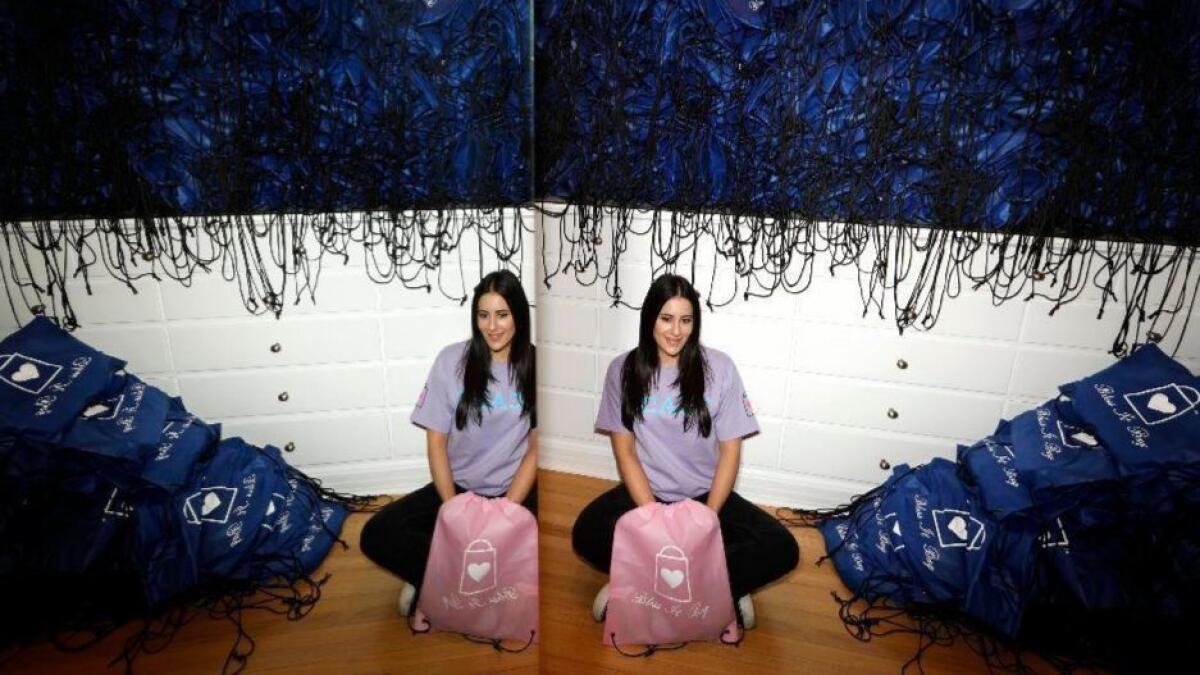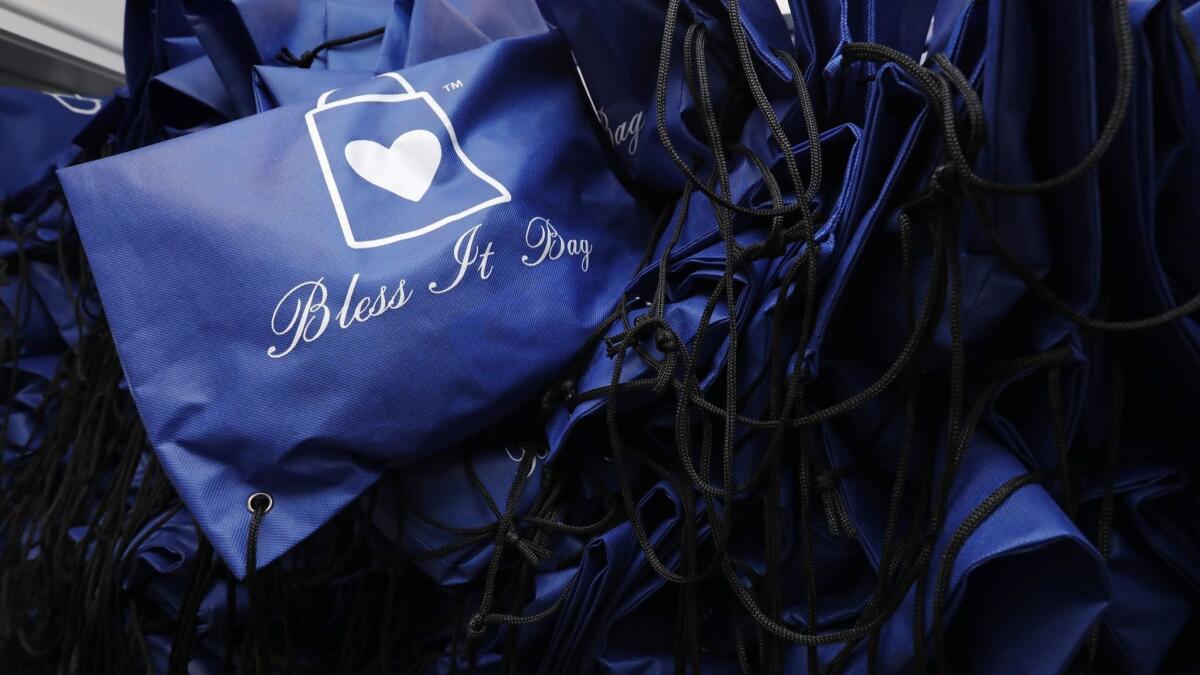‘I want caring to be cool’ — one woman’s Instagram-driven effort to help the homeless

- Share via
Bella Baskin poses near Sunset and Alta Vista boulevards. Looking every bit the hip L.A. millennial, with her sleek black hair, long eyelashes and ripped jeans, she holds a pink drawstring bag in one hand and the leashes of her two Cavalier King Charles Spaniels in the other.
The camera pans up to a bright blue sky, and zooms toward a billboard advertising her new venture, Bless It Bag.
Baskin, 29, posted the video to Bless It Bag’s Instagram account, alongside photos of influencers laughing and posing with the drawstring bags. But the bags aren’t meant for the people modeling them. They are for the city’s homeless population.
She assembles kits with basic hygiene products and snacks and sells them online. The idea is for people to stash them in their car and, when they encounter someone who is homeless and asking for assistance, give out a Bless It Bag instead of cash.
Bless It Bag is a homelessness-focused organization, but if it also feels like a brand, that’s because it is.
Baskin, part of the family that founded the Baskin-Robbins ice cream chain, is fluent in the glitz of Los Angeles Instagram fame. She said she wants to counter the self-involved attitude of her generation and make her peers understand that giving feels good.
“There’s this dynamic of ‘I don’t care,’” Baskin said. “I want caring to be cool. I want that to be what we’re spreading.”
Baskin’s effort — for which she is seeking nonprofit status — is one of many providing assistance to the tens of thousands of homeless people in the region.
Some are small operations, run by volunteers on shoestring budgets; others are large nonprofit organizations, helping not just with the kind intimate necessities found in a bag, but with housing, counseling and other services.
A hygiene bag may seem modest, but any effort to break down stigmas around homelessness is worthy, said Nikola Alenkin, who runs a residential program for homeless veterans.
“It’s not so much what’s given to them, but it’s the thought behind what’s given to them. The symbolism of giving people a sock or deodorant is the opportunity to connect and interact with someone,” Alenkin said. “The small things that we do — that’s human connectedness. It really does make a change and has a ripple effect in the overall problem.”
Baskin came up with the idea while she was working as a photography consultant at Warner Bros. On her daily commute to Burbank, she would drive past a woman who appeared homeless just off the 134 freeway at Pass Avenue, and wanted to help.
She said people are often reluctant to give cash, so she thought hygiene products and snacks would be a good alternative.
Baskin quit her job more than a year ago to devote herself to the project. It took her the better part of five months to stuff 1,500 bags on her own.
She works out of the Beverly Hills house where she grew up — in her childhood bedroom, which her mom converted into office space for them.
Hundreds of blue bags rest atop a white cabinet in Baskin’s office bathroom. Pink bags flood a blue ceramic bathtub, and purple bags are stacked in the shower.
Each one is stuffed with 19 items, including deodorant, shampoo, wipes, lip balm, underwear, socks, a granola bar and a water bottle. The blue bags also include a condom; the pink ones come with pads. The purple bags, for dogs, have kibble and a poop bag.

“Yeah, the bags are hanging out here for now,” Baskin said. “The bathroom is my storage space.”
Baskin has tapped talented friends to help with the video, the billboard and Bless It Bag’s online presence. Instagram influencers such as Jessica Buch and Tiffany Keller, with tens of thousands of followers, model the product and bring it visibility.
Another friend, singer Demi Lovato, has been supportive, attending the December launch party at Baskin’s parents’ home and posting comments on Bless It Bag’s social media.
“It was a big jump — a risky move to quit my job and make this a reality,” Baskin said. “But now that it’s a tangible thing that has a social media presence … more of my friends are excited about it and want to be involved.”
Baskin’s mom, Edie Baskin Bronson, was the head photographer at “Saturday Night Live” for 25 years. Her grandfather was Burton Baskin and her great-uncle was Irv Robbins — the founders of the Baskin-Robbins ice cream chain. She got the $14,000 start-up money she put toward Bless It Bag from her grandmother, and also raised about $4,000 through a GoFundMe campaign.
She’s sold about 200 bags for $20 a piece since her launch party Dec. 15, which she said isn’t a lot, or anywhere near the level she would need for Bless It Bag to be financially sustainable. (Baskin reduced the price of a bag to $15 last week.)
“I come from a creative background. This was a creative idea,” Baskin said. “Navigating the business aspect — finding a lawyer, handling the paperwork side of things — is the hardest part.”
But she’s not daunted yet. She said the simple act of giving someone something they might need — clean socks, a bite to eat — will help people focus less on themselves, and feel the rush of doing a good deed, she said. People work long hours, Baskin said, and this is a way to help for people who don’t have the time to devote weekends to volunteering.
Baskin likes the saying “esteemable acts create self-esteem,” and she repeats it often.
“Obviously I’m not curing the homelessness problem. I’m not giving them homes,” Baskin said. “But with just the simple act of kindness, you’re restoring some humanity and dignity. You’re talking to them, acknowledging their problems.”
More to Read
Sign up for Essential California
The most important California stories and recommendations in your inbox every morning.
You may occasionally receive promotional content from the Los Angeles Times.














